De Nederlandse schrijver Nescio (pseudoniem van Jan Hendrik Frederik Grönloh) werd geboren in Amsterdam op 22 juni 1882. Zie ook alle tags voor Nescio op dit blog.
Uit: Amsterdam Stories (The Freeloader, De Uitvreter, vertaald door Damion Searls)
„Except for the man who thought Sarphatistraat was the most beautiful place in Europe, I’ve never met anyone more peculiar than the freeloader.
The freeloader you found lying in your bed with his dirty shoes on when you came home late; the freeloader who smoked your cigars and filled his pipe with your tobacco and burned your coal and peered into your cupboards and borrowed your money and wore out your shoes and took your coat when he had to go home in the rain. The freeloader who always ordered in someone else’s name, who sat and drank jenever like a prince at the outdoor tables of the Hollandais on other people’s tabs, who borrowed umbrellas and never brought them back, who heated Bavink’s secondhand stove until it cracked, who wore his brother’s double collars and loaned out Appi’s books, and took trips abroad whenever he’d hit up his old man for money again, and wore suits he never paid for.
His first name was Japi. I never knew his last name. Bavink showed up with him when he came back from Veere.
All summer long Bavink had been painting in Zeeland and it was in Veere that he saw Japi for the first time. Japi was just sitting there. Bavink wondered once or twice: Now what kind of guy is that? No one knew. He was always sitting by the water somewhere, just sitring, hour after hour, not moving. At noon and at six he went inside for an hour, to eat; the rest of the day he sat. That lasted about three weeks, then Bavink didn’t see him anymore.
A couple of days later, Bavink was coming back from Rotterdam. Every now and then Bavink needed to have a lot of people around; he tromped along the Rotterdam harbor for a few days, then he’d had enough. On board the ship from Numansdorp to de Zijpe, there was Japi again, sitting. A stiff, cold wind was blowing pretty hard that morning and there were whitecaps on the water. Every now and then spray splashed up over the railing at the bow of the ship. The glass doors on the foredeck were closed; there was no one at the bow. Just Japi, peering out over the rail and getting completely drenched. “Look at that,” Bavink thought, “if it isn’t that same guy.” He went and stood next to him. The boat pitched and rolled. Japi sat on his little bench, held on tight to his cap, and let himself get soaked. This lasted quite a while, until he noticed that someone was standing next to him. “Nice weather we’re having,”
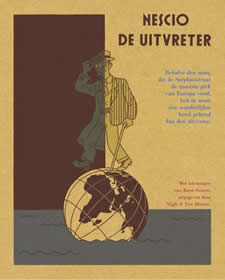
Nescio (22 juni 1882 – 25 juli 1961)
Boekomslag door Joost Swarte, 2006
De Nederlandse dichter Juliën Holtrigter (pseudoniem van Henk van Loenen) werd geboren op 22 juni 1946 in Hilversum. Zie ook alle tags voor Juliën Holtrigter op dit blog.
PELGRIMAGE
Op weg naar Raayens, te voet, even gestopt.
Twijfel aan straathoek Raaiweg / Heupenstallaan.
Foto gemaakt en mij gevraagd: is dit waar?
En zo ja, in hoe ver?
Er was toch meer dan men ziet?
Leg je oor op de rails en verloochen je ogen.
Dan zul je horen geritsel, gerinkel, hoe men moet
lopen om ergens te komen en waarvandaan men
dat doet. Om maar een dwarsstraat te noemen.
Zwaar hangt de slaap in de bomen. De zomer
kauwt op haar weefsels, haar speeksel is oud.
Een stevige beet in jong vlees, dat geneest.
En dan luisteren leren, nog beter.
SPUI
Voor Jean-Jacques Suurmond
Het Spui overstekend, de zon scheen, op weg
naar een dode, hoorde ik zeggen: Ik ben
de verteller en jij bent mijn personage,
een van de vele. Maar laat je niet imponeren.
Ga toch vooral met mijn plot op de loop.
Ja, deze schrijver die mij verzon en beminde,
die mij beschermt, niet tegen waanzin of
wanhoop, niet tegen kanker of dood,
was een moment in het heden!
Ik haal je nog eens met zeer harde hand
uit de stront, zo klonk het daarna nog.
Heb meelij met hen die niet onder worden
gescheten, want je zult zien, ik sta op en
ik keer alles om: ik red het uitschot en
geef hen een naam.
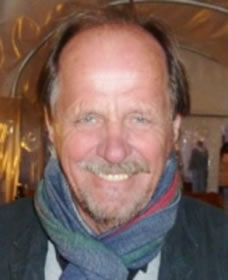
Juliën Holtrigter (Hilversum, 22 juni 1946)
De Nederlandse dichter en theatermaker Jaap Robben werd geboren in Oosterhout op 22 juni 1984. Zie ook alle tags voor Jaap Robben op dit blog.
Graveeltje
Zijn leven is saai als een steen.
Eén dag als een graveeltje
en je verveelt je meteen.
Het enige diertje op aarde
dat niet kan bewegen.
Ligt dagen op straten te wachten
in de hoop op een bezem
die hem verder wil vegen.
Dus wil je dit arme diertje
iets laten beleven
dan kun je ‘m het beste
een rotschop geven.
Twee tranen
Soms moet mijn moeder huilen
zomaar twee tranen uit het niets
en wacht ik op de trap
tot ze me ziet.
Dan kust ze mij.
Tranen hoef je niet te snappen
die zijn er soms gewoon
fluistert ze
en deze zijn allebei voor jou.
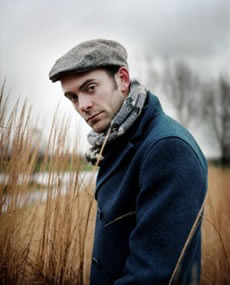
Jaap Robben (Oosterhout, 22 juni 1984)
De Belgische dichter en schrijver Willie Verhegghe werd op 22 juni 1947 te Denderleeuw geboren. Zie ookalle tags voor Willie Verhegghe op dit blog.
Ninove, een ode
De Dender scheurt en schuurt je middendoor
en in de vele zwartgeschubde vissen jaagt
het bloed dat door Filips van Valois met zwaard
en lans en pijl binnen je muren werd vergoten.
Maar je bleef trots en stout,een stad
die zich koestert in haar jas van oude stenen
en warmt aan het zwavelgeel uit de fabrieken
of het licht dat in gloeilampen werd gevat.
Je poorten blijven op de wereld openstaan,
je bier is honing voor de droogste keel
en één dag in het jaar schrijven renners op je asfalt
met hun zweet geschiedenis,een feest van kracht.
En als de avond valt en het duister
van de nacht je torens tart zingen monniken
in hun slapende abdijruïnes een lepradokter
naar de hoge wolken van het heldendom.
De Muur van Geraardsbergen
Rilling en razernij door het peloton:
de Muur van Geraardsbergen staat
als een pantsercolonne van kasseien
te wachten en lacht zijn stenen bloot.
Benen breken in een helse kramp,
hoofd en adem haperen bij zoveel vertoon
van hoog en steil en bijna niet te temmen.
De Muur slaat zijn porfieren klauwen uit,
maait als een oorlog jonge mannen weg.
En houdt dan plots op muur te zijn:
wanneer de strijd bergop gestreden is
en de laatste man zijn lijf behoedzaam
tot zijn oude vormen heeft teruggebracht,
huilt de helling om voorbij verdriet.
Fluweel over de stad die haar torens telt
en de renners afgeranseld naar de finish jaagt.
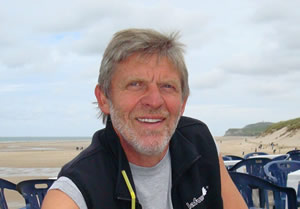
Willie Verhegghe (Denderleeuw, 22 juni 1947)
De Engelse schrijver Henry Rider Haggard werd geboren in Norfolk op 22 juni 1856. Zie ook alle tags voor Henry Rider Haggard op dit blog.
Uit: King Solomon’s Mines
„First reason: Because Sir Henry Curtis and Captain John Good asked me.
Second reason: Because I am laid up here at Durban with the pain in my left leg. Ever since that confounded lion got hold of me I have been liable to this trouble, and being rather bad just now, it makes me limp more than ever. There must be some poison in a lion’s teeth, otherwise how is it that when your wounds are healed they break out again, generally, mark you, at the same time of year that you got your mauling? It is a hard thing when one has shot sixty-five lions or more, as I have in the course of my life, that the sixty-sixth should chew your leg like a quid of tobacco. It breaks the routine of the thing, and putting other considerations aside, I am an orderly man and don’t like that. This is by the way.
Third reason: Because I want my boy Harry, who is over there at the hospital in London studying to become a doctor, to have something to amuse him and keep him out of mischief for a week or so. Hospital work must sometimes pall and grow rather dull, for even of cutting up dead bodies there may come satiety, and as this history will not be dull, whatever else it may be, it will put a little life into things for a day or two while Harry is reading of our adventures.
Fourth reason and last: Because I am going to tell the strangest story that I remember. It may seem a queer thing to say, especially considering that there is no woman in it—except Foulata. Stop, though! there is Gagaoola, if she was a woman, and not a fiend. But she was a hundred at least, and therefore not marriageable, so I don’t count her. At any rate, I can safely say that there is not a petticoat in the whole history.
Well, I had better come to the yoke. It is a stiff place, and I feel as though I were bogged up to the axle. But, “sutjes, sutjes,” as the Boers say—I am sure I don’t know how they spell it—softly does it. A strong team will come through at last, that is, if they are not too poor. You can never do anything with poor oxen. Now to make a start.“
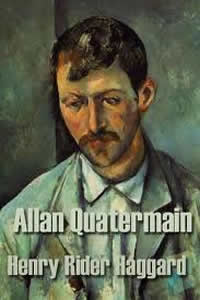
Henry Rider Haggard (22 juni 1856 – 14 mei 1925)
E-book omslag
De Duitse schrijver Erich Maria Remarque (pseudoniem van Erich Paul Remark) werd geboren op 22 juni 1898. Zie ook alle tags voor Erich Maria Remarque op dit blog.
Uit: All Quiet on the Western Front (Vertaald door A. W. Ween)
„We wake up in the middle of the night. The earth booms. Heavy fire is falling on us. We crouch into corners. We distinguish shells of every calibre.
Each man lays hold of his things and looks again every minute to reassure himself that they are still there. The dug-out heaves, the night roars and flashes. We look at each other in the momentary flashes of light, and with pale faces and pressed lips shake our heads.
Every man is aware of the heavy shells tearing down the parapet, rooting up the embankment and demolishing the upper layers of concrete. When a shell lands in the trench we note bow the hollow, furious blast is like a blow from the paw of a raging beast of prey. Already by morning a few of the recruits are green and vomiting. They are too inexperienced….
The bombardment does not diminish. It is falling in the rear too. As far as one can see spout fountains of mud and iron. A wide belt is being raked.
The attack does not come, but the bombardment continues. We are gradually benumbed. Hardly a man speaks. We cannot make ourselves understood.
Our trench is almost gone. At many places it is only eighteen inches high, it is broken by holes, and craters, and mountains of earth. A shell lands square in front of our post. At once it is dark. We are buried and must dig ourselves out….“
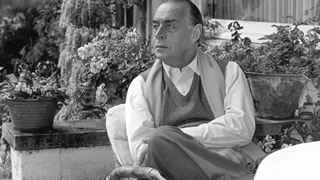
Erich Maria Remarque (22 juni 1898 – 25 september 1970)
De Amerikaanse schrijver Dan Brown werd geboren in Exeter, New Hampshire, op 22 juni 1964. Zie ook alle tags voor Dan Brown op dit blog.
Uit: Angels & Demons
„High atop the steps of the Great Pyramid of Giza a young woman laughed and called down to him. “Robert, hurry up! I knew I should have married a younger man!” Her smile was magic.
He struggled to keep up, but his legs felt like stone. “Wait,” he begged. “Please…”
As he climbed, his vision began to blur. There was a thundering in his ears. I must reach her! But when he looked up again, the woman had disappeared. In her place stood an old man with rotting teeth. The man stared down, curling his lips into a lonely grimace. Then he let out a scream of anguish that resounded across the desert.
Robert Langdon awoke with a start from his nightmare. The phone beside his bed was ringing. Dazed, he picked up the receiver.
“Hello?”
“I’m looking for Robert Langdon,” a man’s voice said.
Langdon sat up in his empty bed and tried to clear his mind. “This…is Robert Langdon.” He squinted at his digital clock. It was 5:18 A.M.
“I must see you immediately.”
“Who is this?”
“My name is Maximilian Kohler. I’m a discrete particle physicist.”
“A what?” Langdon could barely focus. “Are you sure you’ve got the right Langdon?”
“You’re a professor of religious iconology at Harvard University. You’ve written three books on symbology and — “
“Do you know what time it is?”
“I apologize. I have something you need to see. I can’t discuss it on the phone.”
A knowing groan escaped Langdon’s lips. This had happened before. One of the perils of writing books about religious symbology was the calls from religious zealots who wanted him to confirm their latest sign from God. Last month a stripper from Oklahoma had promised Langdon the best sex of his life if he would fly down and verify the authenticity of a cruciform that had magically appeared on her bed sheets. The Shroud of Tulsa, Langdon had called it.“

Dan Brown (Exeter, 22 juni 1964)
Zie voor nog meer schrijvers van de 22e juni ook mijn blog van 22 juni 2011 deel 1 en eveneens deel 2.
